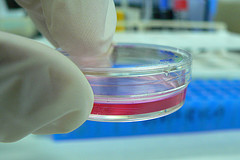Laboratory Meat
 Cultured meat is a term used for meat products that are grown in a laboratory from cells in a new type of 'farming' called cellular agriculture.
Cultured meat is a term used for meat products that are grown in a laboratory from cells in a new type of 'farming' called cellular agriculture.
Why do this? All the animals that we need to provide our food require a lot of space, food and water and some of these animals also create a lot of gas! Methane is a gas produced by cows, pigs and sheep and is said to be one of biggest contributions to greenhouse gas emissions. Greenhouses gases are gases that stay high up in the sky to form an invisible blanket around the earth, trapping heat in the atmosphere and causing what is known as global warming. To solve all of these problems scientists have been growing muscles (the part of the animal we eat) in laboratories using tiny microscopic cells.
Our bodies are made up of billions of cells and some of these are called stem cells. Stem cells are what help develop babies in the womb and in adults they help to repair damage to the body. Stem cells can repeat themselves over and over and this is how scientists are growing steaks in plastic dishes. Stem cells are taken from live animals without harming them and then these tiny particles can be put into the laboratory and under the right conditions a muscle will grow.
The first 'no kill' burger was created in a lab in 2013, but, in those early days of the technology, the process took two years to perfect and the resulting burger cost $300,000 (£226,882) to produce! By 2016, a company called Memphis Meats produced a $1000 (£756) meatball and, in 2020, a US company called Eat Just received safety approval from Singapore to release it's cultured, lab-grown 'chicken bites'. The cells for the 'chicken' are grown in a 1,200-litre bioreactor and then mixed with plant-based ingredients. Although the bites will only be available in Singaporean restaurants at first, and will be relatively expensive, Eat Just claims that future products will be cheaper than chicken raised from animals.
This raises interesting debates as to whether lab-grown meat would be suitable for vegetarians to eat, since it will not have involved harming any live animals.
Read More: Insects